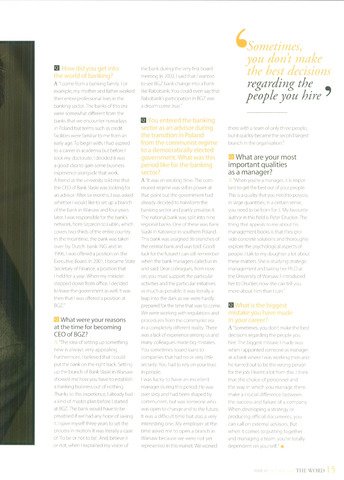6Sometimes,
you dont make
the best decisions
regarding the
people you hire
El
the world of banking?
What were your reasons
at the time for becoming
CEO of BGZ?
You entered the banking
sector as an advisor during
the transition in Poland
from the communist regime
to a democratically elected
government. What was this
period like for the banking
sector?
What are your most
important qualities
asa manager?
19
mistake you have made
in your career?
A "I come from a banking family. For
example, my mother and father worked
theirentire professional lives in the
banking sector. The banksofthisera
were somewhat different from the
banks that we encounter nowadays
in Poland but terms such as credit
facilities were familiar to me from an
early age. To begin with, I had aspired
to a career in academia but before I
took my doctorate, I decided it was
a good idea to gain some business
experience alongside that work.
A friend at the university told me that
the CEO of Bank Slaski was looking for
an advisor. After six months, I was asked
whether I would like to set up a branch
of the bank in Warsaw and four years
later, I was responsible for the bank's
network, from Szczecin to Lublin, which
covers two thirds of the entire country.
In the meantime, the bank was taken
over by Dutch bank ING and in
1996,1 was offered a position on the
Executive Board. In 20011 became State
Secretary of Finance, a position that
I held for a year. When my minister
stepped down from office, I decided
to leave the government as well. It was
then that I was offered a position at
BGZ."
'The idea of setting up something
new is always very appealing.
Furthermore, I believed that I could
put the bank on the right track. Setting
up the branch of Bank Slaski in Warsaw
showed me how you have to establish
a banking business out of nothing.
Thanks to this experience, I already had
a kind of master plan before I started
at BGZ. The bank would have to be
privatised if we had any hope of saving
it. I gave myself three years to set the
process in motion. It was literally a case
of To be or not to be'. And, believe it
or not, when I explained my vision of
the bank during the very first board
meeting in 2002,1 said that I wanted
to see BGZ bank change into a bank
like Rabobank. You could even say that
Rabobank's participation in BGZ was
a dream come true."
A "It was an exciting time. The com
munist regime was still in power at
that point but the government had
already decided to transform the
banking sector and partly privatise it.
The national bank was split into nine
regional banks. One of these was Bank
Slaski in Katowice in southern Poland.
This bank was assigned 36 branches of
the central bank and was told: Good
luck for the future! I can still remember
when the bank managers called us in
and said: Dear colleagues, from now
on, you must support the particular
activities and the particular initiatives
as much as possible. It was literally a
leap into the dark as we were hardly
prepared for the time that was to come.
We were working with regulations and
procedures from the communist era
in a completely different reality. There
was a lack of experience among us and
many colleagues made big mistakes.
You sometimes issued loans to
companies that had no or very little
security. You had to rely on your trust
in people.
I was lucky to have an excellent
manager during this period. FHe was
over sixty and had been shaped by
communism, but was someone who
was open to change and to the future.
It was a diffïcult time but also a very
interesting one. My employer at the
time asked me to open a branch in
Warsaw because we were not yet
represented in this market. We worked
there with a team of only three people,
but it quickly became the second largest
branch in the organisation."
A "When you're a manager, it is impor
tant to get the best out of your people.
This is a quality that you need to possess
in large quantities; in a certain sense,
you need to be bom for it. My favourite
author in this field is Peter Drucker. The
thing that appeals to me about his
management books is that they pro
vide concrete solutions and thoroughly
explore the psychological aspects of
people. I talk to my daughter a lot about
these matters. She is studying strategie
management and taking her Ph.D at
the University of Warsaw. I introduced
her to Drucker; now she can teil you
more about him than I can."
A "Sometimes, you don't make the best
decisions regarding the people you
hire. The biggest mistake I made was
when I appointed someone as manager
at a bank where I was working then and
he turned out to be the wrong person
for the job. I learnt a lot from this. I think
that the choice of personnel and
the way in which you manage them
make a crucial difference between
the success and failure of a company.
When developing a strategy or
producing official documents, you
can call on external advisors. But
when it comes to putting together
and managing a team, you're totally
dependent on yourself."
ISSUE 17
'THE WORD

